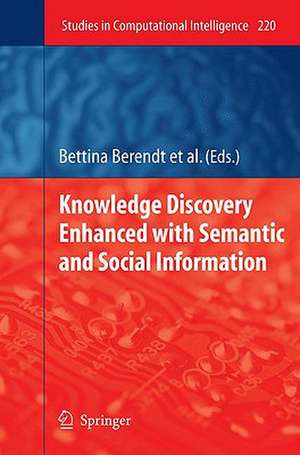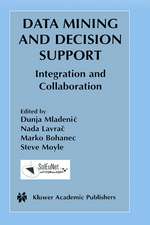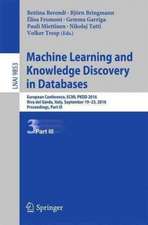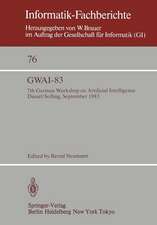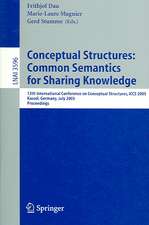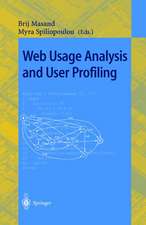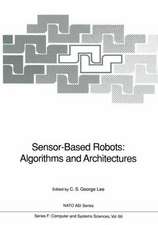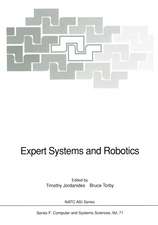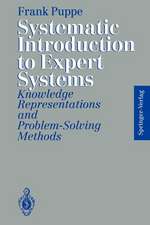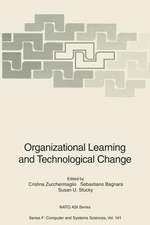Knowledge Discovery Enhanced with Semantic and Social Information: Studies in Computational Intelligence, cartea 220
Editat de Bettina Berendt, Dunja Mladenic, Marco de Gemmis, Giovanni Semeraro, Myra Spiliopoulou, Gerd Stumme, Vojtech Svatek, Filip Železnýen Limba Engleză Hardback – 29 iun 2009
| Toate formatele și edițiile | Preț | Express |
|---|---|---|
| Paperback (1) | 638.69 lei 6-8 săpt. | |
| Springer Berlin, Heidelberg – 6 noi 2014 | 638.69 lei 6-8 săpt. | |
| Hardback (1) | 644.81 lei 6-8 săpt. | |
| Springer Berlin, Heidelberg – 29 iun 2009 | 644.81 lei 6-8 săpt. |
Din seria Studies in Computational Intelligence
- 20%
 Preț: 449.37 lei
Preț: 449.37 lei - 20%
 Preț: 1158.26 lei
Preț: 1158.26 lei - 20%
 Preț: 986.66 lei
Preț: 986.66 lei - 20%
 Preț: 1452.76 lei
Preț: 1452.76 lei - 20%
 Preț: 168.78 lei
Preț: 168.78 lei - 20%
 Preț: 1291.10 lei
Preț: 1291.10 lei - 18%
 Preț: 1112.30 lei
Preț: 1112.30 lei - 20%
 Preț: 565.39 lei
Preț: 565.39 lei - 20%
 Preț: 649.28 lei
Preț: 649.28 lei - 20%
 Preț: 1047.73 lei
Preț: 1047.73 lei - 20%
 Preț: 1578.96 lei
Preț: 1578.96 lei - 20%
 Preț: 643.50 lei
Preț: 643.50 lei - 20%
 Preț: 657.49 lei
Preț: 657.49 lei - 20%
 Preț: 993.28 lei
Preț: 993.28 lei - 20%
 Preț: 990.80 lei
Preț: 990.80 lei - 20%
 Preț: 989.96 lei
Preț: 989.96 lei - 20%
 Preț: 1165.69 lei
Preț: 1165.69 lei - 20%
 Preț: 1444.52 lei
Preț: 1444.52 lei - 20%
 Preț: 1041.96 lei
Preț: 1041.96 lei - 20%
 Preț: 1047.73 lei
Preț: 1047.73 lei - 20%
 Preț: 1046.06 lei
Preț: 1046.06 lei - 18%
 Preț: 2500.50 lei
Preț: 2500.50 lei - 20%
 Preț: 989.13 lei
Preț: 989.13 lei - 20%
 Preț: 1165.69 lei
Preț: 1165.69 lei - 20%
 Preț: 1164.05 lei
Preț: 1164.05 lei - 20%
 Preț: 1042.79 lei
Preț: 1042.79 lei - 20%
 Preț: 1460.19 lei
Preț: 1460.19 lei - 18%
 Preț: 1403.52 lei
Preț: 1403.52 lei - 18%
 Preț: 1124.92 lei
Preț: 1124.92 lei - 20%
 Preț: 1039.47 lei
Preț: 1039.47 lei - 20%
 Preț: 1008.11 lei
Preț: 1008.11 lei - 20%
 Preț: 1045.25 lei
Preț: 1045.25 lei - 20%
 Preț: 1275.42 lei
Preț: 1275.42 lei - 20%
 Preț: 1040.32 lei
Preț: 1040.32 lei - 20%
 Preț: 988.32 lei
Preț: 988.32 lei - 20%
 Preț: 1169.79 lei
Preț: 1169.79 lei - 20%
 Preț: 1162.37 lei
Preț: 1162.37 lei - 20%
 Preț: 1059.26 lei
Preț: 1059.26 lei - 20%
 Preț: 1164.05 lei
Preț: 1164.05 lei - 20%
 Preț: 1166.52 lei
Preț: 1166.52 lei - 20%
 Preț: 1459.38 lei
Preț: 1459.38 lei - 18%
 Preț: 1005.74 lei
Preț: 1005.74 lei - 20%
 Preț: 997.38 lei
Preț: 997.38 lei - 20%
 Preț: 1055.94 lei
Preț: 1055.94 lei - 20%
 Preț: 1284.47 lei
Preț: 1284.47 lei - 20%
 Preț: 994.08 lei
Preț: 994.08 lei - 20%
 Preț: 1048.72 lei
Preț: 1048.72 lei - 20%
 Preț: 1066.02 lei
Preț: 1066.02 lei - 20%
 Preț: 943.78 lei
Preț: 943.78 lei - 20%
 Preț: 1173.10 lei
Preț: 1173.10 lei
Preț: 644.81 lei
Preț vechi: 806.01 lei
-20% Nou
Puncte Express: 967
Preț estimativ în valută:
123.40€ • 128.36$ • 101.87£
123.40€ • 128.36$ • 101.87£
Carte tipărită la comandă
Livrare economică 14-28 aprilie
Preluare comenzi: 021 569.72.76
Specificații
ISBN-13: 9783642018909
ISBN-10: 3642018904
Pagini: 156
Ilustrații: X, 143 p.
Dimensiuni: 155 x 235 x 18 mm
Greutate: 0.4 kg
Ediția:2009
Editura: Springer Berlin, Heidelberg
Colecția Springer
Seria Studies in Computational Intelligence
Locul publicării:Berlin, Heidelberg, Germany
ISBN-10: 3642018904
Pagini: 156
Ilustrații: X, 143 p.
Dimensiuni: 155 x 235 x 18 mm
Greutate: 0.4 kg
Ediția:2009
Editura: Springer Berlin, Heidelberg
Colecția Springer
Seria Studies in Computational Intelligence
Locul publicării:Berlin, Heidelberg, Germany
Public țintă
ResearchCuprins
Prior Conceptual Knowledge in Machine Learning and Knowledge Discovery.- On Ontologies as Prior Conceptual Knowledge in Inductive Logic Programming.- A Knowledge-Intensive Approach for Semi-automatic Causal Subgroup Discovery.- A Study of the SEMINTEC Approach to Frequent Pattern Mining.- Partitional Conceptual Clustering of Web Resources Annotated with Ontology Languages.- The Ex Project: Web Information Extraction Using Extraction Ontologies.- Dealing with Background Knowledge in the SEWEBAR Project.- Web Mining 2.0.- Item Weighting Techniques for Collaborative Filtering.- Using Term-Matching Algorithms for the Annotation of Geo-services.
Textul de pe ultima copertă
This book is a showcase of recent advances in knowledge discovery enhanced with semantic and social information. It includes eight contributed chapters that grew out of two joint workshops at ECML/PKDD 2007.
There is general agreement that the effectiveness of Machine Learning and Knowledge Discovery output strongly depends not only on the quality of source data and the sophistication of learning algorithms, but also on additional input provided by domain experts. There is less agreement on whether, when and how such input can and should be formalized as explicit prior knowledge.
The six chapters in the first part of the book aim to investigate this aspect by addressing four different topics: inductive logic programming; the role of human users; investigations of fully automated methods for integrating background knowledge; the use of background knowledge for Web mining. The two chapters in the second part are motivated by the Web 2.0 (r)evolution and the increasingly strong role of user-generated content. The contributions emphasize the vision of the Web as a social medium for content and knowledge sharing.
There is general agreement that the effectiveness of Machine Learning and Knowledge Discovery output strongly depends not only on the quality of source data and the sophistication of learning algorithms, but also on additional input provided by domain experts. There is less agreement on whether, when and how such input can and should be formalized as explicit prior knowledge.
The six chapters in the first part of the book aim to investigate this aspect by addressing four different topics: inductive logic programming; the role of human users; investigations of fully automated methods for integrating background knowledge; the use of background knowledge for Web mining. The two chapters in the second part are motivated by the Web 2.0 (r)evolution and the increasingly strong role of user-generated content. The contributions emphasize the vision of the Web as a social medium for content and knowledge sharing.
Caracteristici
Presents latest results on knowledge discovery enhanced with semantic and social information
